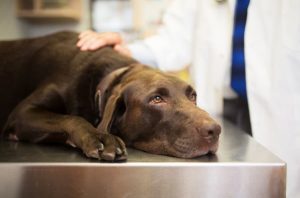
From allergic reactions to sudden injuries, you just never know when your faithful companion may need urgent care. While pet owners hope an emergency never arises, it’s always best to be prepared just in case. At West Park Animal Hospital, we provide critical care to dogs and cats. Here, we’ll detail some of the things you should do in the event of a pet emergency.
Stop and Assess the Situation
The first thing to remember is to stay calm. Pets often take cues from their owners, and outward panic may cause them to become fearful, as well. The calmer your pet is, the easier they’ll be for you to handle in situations like this. Also, it will make it easier for you to pick up on subtle symptoms that may be important for your veterinarian to know.
Next, do a quick assessment of your pet. Something like a laceration or broken bone may be easier to see, but an internal illness may be harder to pick up on. Paying attention to your animal’s cues and behavior changes will give your veterinarian a general basis for testing or diagnosis when you arrive.
Call Your Pet’s Veterinarian
True pet emergencies require immediate intervention. No matter what’s wrong with your dog or cat, their veterinarian will know how to handle the situation. They’re familiar with your pet’s medical history and can make informed recommendations. When you call, be ready to communicate any obvious or possible symptoms to the veterinarian or assistant on the line.
If your pet has swallowed something potentially dangerous, make sure to call your veterinarian very quickly. If you can’t reach the veterinarian your animal usually sees, there may be other options, such as a local emergency animal hospital or an animal poison control center, such as:
The sooner your pet receives the help they need, the easier they’ll be to treat. It increases the likelihood of a more positive outcome and reduces the risk of complications. It’s also important to know that pets under stress may be more aggressive toward people, so take care when getting them ready to go to the clinic.
Signs of a Pet Emergency
Your pet could exhibit any number of telltale signs in an emergency. For many pet owners, the cause might be obvious, such as eating something harmful. In other cases, symptoms can seemingly arise out of nowhere. They widely vary based on the cause and range from subtle to severe. Common signs to look for in your dog or cat include:
- Choking
- Excessive bleeding
- Vomiting
- Blood in diarrhea
- Obvious pain or limping
- Seizures
- Eye injury
- Fluid refusal for more than 24 hours
- Unconsciousness
- Anxious behavior
- Excessive coughing
- Rapid or difficulty breathing
- Inability to deliver offspring
For pet owners familiar with basic first aid, it may help stabilize your animal before they reach the clinic. However, this should not replace emergency care from a qualified professional. Pet owners should still call their vet right away and follow any instructions provided. When you arrive, your vet will assess the issue and may use pain management techniques to help control your pet’s discomfort.
After your pet is stable, your veterinarian will review their treatment plan. This may involve temporary medication or long-term rehab/orthopedics, depending on the extent of the condition.
Being a Prepared Pet Owner
As your pet’s primary caregiver and preferred companion, they rely on you to know what to do when they need help. A big part of owning a pet is being prepared in the event of a true medical emergency. Here are some important phone numbers to remember:
-
- Pet’s veterinarian (they should be your first call)
- Local emergency vet clinic
- Animal poison control
Some pet owners learn pet CPR from organizations like American Red Cross, how to stop bleeding, and other basic first aid techniques. Pet owners may also want a muzzle on hand to help prevent their pet from biting others on the way to the clinic or while there. That way, your vet can effectively treat them as soon as you arrive.
Your veterinarian can offer emergency information during any wellness visit, so you have an idea of what to expect at the clinic under these circumstances.
Emergency Care at West Park Animal Hospital
The team at West Park Animal Hospital is prepared to handle a pet emergency. Our state-of-the-art facility uses leading technology to diagnose urgent ailments. We proudly serve the residents of West Park, North Olmsted, Berea, Rocky River, Lakewood, Fairview Park, and Cleveland, Ohio, as well as the surrounding areas. For more information, contact us today.

